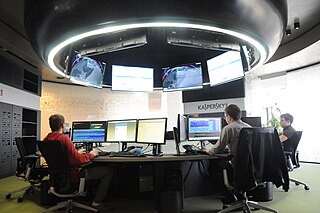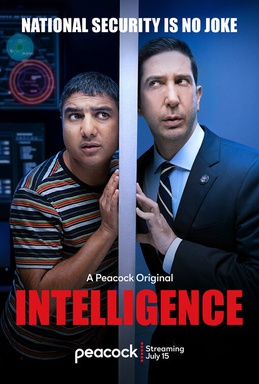
Government Communications Headquarters (GCHQ) is an intelligence and security organisation responsible for providing signals intelligence (SIGINT) and information assurance (IA) to the government and armed forces of the United Kingdom. Primarily based at "The Doughnut" in the suburbs of Cheltenham, GCHQ is the responsibility of the country's Secretary of State for Foreign and Commonwealth Affairs, but it is not a part of the Foreign Office and its Director ranks as a Permanent Secretary.

GCHQ Bude, also known as GCHQ Composite Signals Organisation Station Morwenstow, abbreviated to GCHQ CSO Morwenstow, is a UK Government satellite ground station and eavesdropping centre located on the north Cornwall coast at Cleave Camp, between the small villages of Morwenstow and Coombe. It is operated by the British signals intelligence service, officially known as the Government Communications Headquarters, commonly abbreviated GCHQ. It is located on part of the site of the former World War II airfield, RAF Cleave.

Kaspersky Anti-Virus is a proprietary antivirus program developed by Kaspersky Lab. It is designed to protect users from malware and is primarily designed for computers running Microsoft Windows and macOS, although a version for Linux is available for business consumers.
Cyberwarfare by Russia includes denial of service attacks, hacker attacks, dissemination of disinformation and propaganda, participation of state-sponsored teams in political blogs, internet surveillance using SORM technology, persecution of cyber-dissidents and other active measures. According to investigative journalist Andrei Soldatov, some of these activities were coordinated by the Russian signals intelligence, which was part of the FSB and formerly a part of the 16th KGB department. An analysis by the Defense Intelligence Agency in 2017 outlines Russia's view of "Information Countermeasures" or IPb as "strategically decisive and critically important to control its domestic populace and influence adversary states", dividing 'Information Countermeasures' into two categories of "Informational-Technical" and "Informational-Psychological" groups. The former encompasses network operations relating to defense, attack, and exploitation and the latter to "attempts to change people's behavior or beliefs in favor of Russian governmental objectives."

Kaspersky Lab is a Russian multinational cybersecurity and anti-virus provider headquartered in Moscow, Russia, and operated by a holding company in the United Kingdom. It was founded in 1997 by Eugene Kaspersky, Natalya Kaspersky and Alexey De-Monderik. Kaspersky Lab develops and sells antivirus, internet security, password management, endpoint security, and other cybersecurity products and services.
Cyberweapons are commonly defined as malware agents employed for military, paramilitary, or intelligence objectives as part of a cyberattack. This includes computer viruses, trojans, spyware, and worms that can introduce malicious code into existing software, causing a computer to perform actions or processes unintended by its operator.

During the 2010s, international media reports revealed new operational details about the Anglophone cryptographic agencies' global surveillance of both foreign and domestic nationals. The reports mostly relate to top secret documents leaked by ex-NSA contractor Edward Snowden. The documents consist of intelligence files relating to the U.S. and other Five Eyes countries. In June 2013, the first of Snowden's documents were published, with further selected documents released to various news outlets through the year.
The Joint Threat Research Intelligence Group (JTRIG) is a unit of the Government Communications Headquarters (GCHQ), the British intelligence agency. The existence of JTRIG was revealed as part of the global surveillance disclosures in documents leaked by the former National Security Agency contractor Edward Snowden.
A man-on-the-side attack is a form of active attack in computer security similar to a man-in-the-middle attack. Instead of completely controlling a network node as in a man-in-the-middle attack, the attacker only has regular access to the communication channel, which allows him to read the traffic and insert new messages, but not to modify or delete messages sent by other participants. The attacker relies on a timing advantage to make sure that the response he sends to the request of a victim arrives before the legitimate response.
Regin is a sophisticated malware and hacking toolkit used by United States' National Security Agency (NSA) and its British counterpart, the Government Communications Headquarters (GCHQ). It was first publicly revealed by Kaspersky Lab, Symantec, and The Intercept in November 2014. The malware targets specific users of Microsoft Windows-based computers and has been linked to the US intelligence-gathering agency NSA and its British counterpart, the GCHQ. The Intercept provided samples of Regin for download, including malware discovered at a Belgian telecommunications provider, Belgacom. Kaspersky Lab says it first became aware of Regin in spring 2012, but some of the earliest samples date from 2003. Among computers infected worldwide by Regin, 28 percent were in Russia, 24 percent in Saudi Arabia, 9 percent each in Mexico and Ireland, and 5 percent in each of India, Afghanistan, Iran, Belgium, Austria, and Pakistan.
The Equation Group, classified as an advanced persistent threat, is a highly sophisticated threat actor suspected of being tied to the Tailored Access Operations (TAO) unit of the United States National Security Agency (NSA). Kaspersky Labs describes them as one of the most sophisticated cyber attack groups in the world and "the most advanced (...) we have seen", operating alongside the creators of Stuxnet and Flame. Most of their targets have been in Iran, Russia, Pakistan, Afghanistan, India, Syria and Mali.
Playground Entertainment is a television, film and theatre production company with offices in New York and London, founded in 2012 by Sir Colin Callender, former President of HBO Films.
Cozy Bear, classified by the United States federal government as advanced persistent threat APT29, is a Russian hacker group believed to be associated with one or more intelligence agencies of Russia. The Dutch General Intelligence and Security Service (AIVD) deduced from security camera footage that it is led by the Russian Foreign Intelligence Service (SVR), a view shared by the United States. Cybersecurity firm CrowdStrike also previously suggested that it may be associated with either the Russian Federal Security Service (FSB) or SVR. The group has been given various nicknames by other cybersecurity firms, including CozyCar, CozyDuke, Dark Halo, The Dukes, Midnight Blizzard, NOBELIUM, Office Monkeys, StellarParticle, UNC2452, and YTTRIUM.
The Shadow Brokers (TSB) is a hacker group who first appeared in the summer of 2016. They published several leaks containing hacking tools, including several zero-day exploits, from the "Equation Group" who are widely suspected to be a branch of the National Security Agency (NSA) of the United States. Specifically, these exploits and vulnerabilities targeted enterprise firewalls, antivirus software, and Microsoft products. The Shadow Brokers originally attributed the leaks to the Equation Group threat actor, who have been tied to the NSA's Tailored Access Operations unit.
Sir Jeremy Ian Fleming was the Director of the Government Communications Headquarters, the UK's intelligence, cyber and security agency. He was appointed in 2017 and was the 16th person to hold the role. He left the post in May 2023.

Petya is a family of encrypting malware that was first discovered in 2016. The malware targets Microsoft Windows–based systems, infecting the master boot record to execute a payload that encrypts a hard drive's file system table and prevents Windows from booting. It subsequently demands that the user make a payment in Bitcoin in order to regain access to the system.

Intelligence is a British television sitcom created by Nick Mohammed and starring Mohammed and David Schwimmer. It began airing on Sky One on 21 February 2020. The network confirmed a series 2 pickup on 13 February 2020. Series 2 premiered on 8 June 2021 on Sky One and streaming service Now. An all-new one–hour TV film special was announced by Peacock in April 2023, titled Intelligence: A Special Agent Special, that sees Jerry and Joseph fight off a rival operative trying to take down their business and destroy them in order to get what she wants from them. The special was released in the US on 11 May 2023, after being released first in the UK on 8 April on Sky Comedy and NOW TV.

Sandworm is an advanced persistent threat operated by Military Unit 74455, a cyberwarfare unit of the GRU, Russia's military intelligence service. Other names for the group, given by cybersecurity researchers, include Telebots, Voodoo Bear, IRIDIUM, Seashell Blizzard, and Iron Viking.

During the prelude to the Russian invasion of Ukraine and the Russian invasion of Ukraine, multiple cyberattacks against Ukraine were recorded, as well as some attacks on Russia. The first major cyberattack took place on 14 January 2022, and took down more than a dozen of Ukraine's government websites. According to Ukrainian officials, around 70 government websites, including the Ministry of Foreign Affairs, the Cabinet of Ministers, and the National and Defense Council (NSDC), were attacked. Most of the sites were restored within hours of the attack. On 15 February, another cyberattack took down multiple government and bank services.







